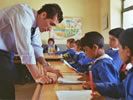Eye For Film >> Movies >> On The Way To School (2008) Film Review
On The Way To School
Reviewed by: Amber Wilkinson

For a while it looked as though the art of unobtrusive observation was a lost art. With the likes of Michael Moore, Nick Broomfield and Morgan Spurlock elevating their presence by stepping in front of the camera to the point of upstaging their subjects, documentary by manipulation has had quite a run.
There are encouraging signs, however, that their brand of in-your-face polemic is, if not on the wane, then at least now being balanced out by documentarians such as Ozgür Dogan and Orhan Eskikoy who have reverted to, arguably, far superior old-school techniques, such as 'watching' and 'listening'. They take their cameras into the wilds of Turkey to trace a year in the life of recently graduated primary school teacher Emre. Like all newly qualified teachers, he is required to spend a year in a rural Kurdish area, teaching the little ones Turkish.

We're told briefly, by intertitles at the outset, that it is Turkish government policy to sideline Kurdish, so despite the fact that this is all the kids have learned to speak at home, school is a solely Turkish-tongue environment. That, initially, is the least of Emre's problems. He arrives - in true 'town mouse' style - to the sort of extreme rural environment not glimpsed on celluloid since Borat was making "glorious" observations about Kazakstahn. "There's nothing here," he says. "Nothing at all." Except, as he soon discovers, bad phone reception, far too many ants and a lot of kids living in crushing poverty.
Before he can begin his lessons, he has to hunt down his charges, allowing us to register his own shock at the lack of amenities the village of Sanliurfa has and form our own opinions concerning the government marginalisation of the Kurdish. Since there are no interviews with Emre and much of the action appears to be caught on 'fixed' camera, his regular conversations with his mum are the closest we get to hearing him voice an opinion, although his actions speak volumes.
Once he has gathered the kids in the classroom it becomes apparent that they speak virtually no Turkish - since he speaks no Kurdish, this leads to the swift realisation that one man's sanity is going to have a tough time standing up to the onslaught of 20 keen but completely confused under-sevens.
What ensues is a battle of wills as the sweet fish-out-of-water teacher attempts by every means possible to get his kids up to speed with Turkish. Even as they begin to learn the words, it seems the concepts are passing them by. After finally getting one boy to say "walnut" instead of "malnut" he asks him if he knows what it is... the kid's face is a perfect mask of puzzlement. Frustrations bubble up for Emre but, amazingly, he manages to retain both a keeness to teach and an ability to see the funny side. "You have no idea what I'm saying have you?" he says to a group of kids in the playground. "But you'll laugh anyway," he adds, as the youngsters oblige as if he'd asked them to.
Subtitles are employed cleverly by Dogan and Eskikoy, frequently translating the Kurdish as well as the Turkish so that we can see 'jokes' Emre is unaware of. A key moment, for example, comes when one of the elders of the village offers to translate what Emre is saying for some of the parents who don't speak Turkish, only to tell them something completely different to the instruction Emre is trying to convey. The cameras are always at a respectful distance, which results in a verite feel, with the children and adults alike seemingly unaware they are being captured on film.
This is a film concerned with how easy it is for common sense to get lost in translation. It's simple, one presumes, to sit in a city and dictate that children must learn to speak Turkish despite the fact they will probably never use it unless they leave their home village, but it is quite another to be the man on the ground trying to put that policy into action. Dogan and Eskikoy don't offer a value judgement or an opinion, they simply turn the watchful eye of their cameras on the absurdity of the situation - and the impoverished circumstances in which the children live - and let us form our own conclusions.
Reviewed on: 10 Jul 2009
















